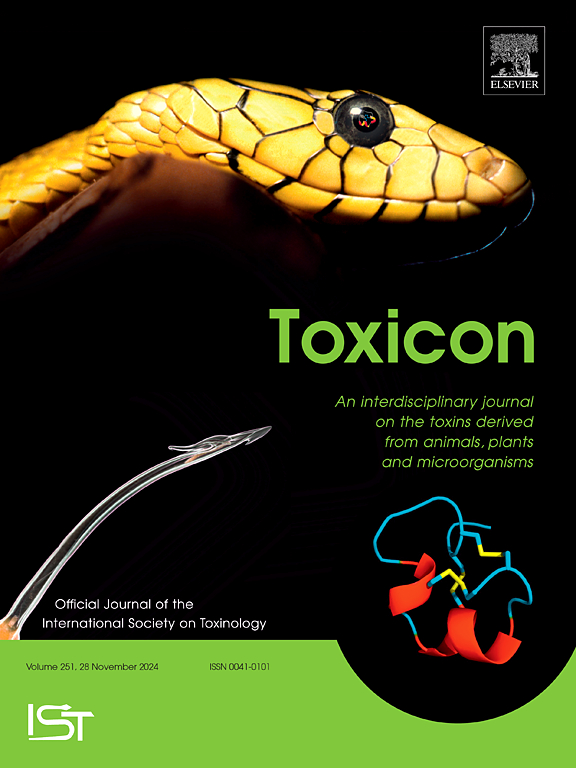Immunomodulatory effect of selective COX-2 inhibitor celecoxib on the neuropathological disorders and immunoinflammatory response induced by Kaliotoxin from Androctonus australis venom
IF 2.6
4区 医学
Q2 PHARMACOLOGY & PHARMACY
引用次数: 0
Abstract
The immune response is increasingly being linked to the pathogenic processes underlying neurological disorders including potassium channel malfunction. Few investigations, meanwhile, have shown how cyclooxygenase-2 (COX-2) is involved in the neuroimmunopathology linked to potassium channel failure. Thus, using an animal model of neuropathology caused by kaliotoxin, an exclusive blocker of voltage-gated potassium channels from the scorpion venom of Androctonus australis hector, we examined the immunomodulatory impact of celecoxib (selective inhibitor of COX-2). The neural and systemic pathogenic effects of KTX can be considerably reduced by celecoxib-mediated COX-2 inhibition, according to the results. It most certainly works via controlling the immunoinflammatory exposure by raising IL-10 levels; decreasing proinflammatory cytokine levels including mostly TNFα and IL-6, and balancing oxidative status. Along with that, by significantly promoting tissue healing, COX-2 inhibitor also enhances cellular metabolism. One potential treatment approach for immunoinflammatory exacerbations linked to neurodegenerative is the COX-2 inhibitor.

选择性COX-2抑制剂塞来昔布对南方雄蛾毒钾毒素诱导的神经病理障碍和免疫炎症反应的免疫调节作用。
免疫反应越来越多地与包括钾离子通道功能失调在内的神经系统疾病的致病过程联系在一起。与此同时,很少有研究表明环氧化酶-2(COX-2)如何参与了与钾离子通道失灵相关的神经免疫病理过程。因此,我们利用一种由卡利毒素(一种专门阻断电压门控钾通道的物质,来自 Androctonus australis hector 蝎子毒液)引起的神经病理学动物模型,研究了塞来昔布(COX-2 的选择性抑制剂)对免疫调节的影响。结果表明,通过塞来昔布介导的 COX-2 抑制作用,KTX 对神经和全身的致病作用可以大大降低。它的作用原理无疑是通过提高 IL-10 水平来控制免疫炎症暴露;降低促炎细胞因子水平(主要包括 TNFα 和 IL-6)并平衡氧化状态。此外,COX-2 抑制剂还能明显促进组织愈合,增强细胞新陈代谢。COX-2 抑制剂是治疗与神经退行性疾病相关的免疫炎症加重的一种潜在方法。
本文章由计算机程序翻译,如有差异,请以英文原文为准。
求助全文
约1分钟内获得全文
求助全文
来源期刊

Toxicon
医学-毒理学
CiteScore
4.80
自引率
10.70%
发文量
358
审稿时长
68 days
期刊介绍:
Toxicon has an open access mirror Toxicon: X, sharing the same aims and scope, editorial team, submission system and rigorous peer review. An introductory offer Toxicon: X - full waiver of the Open Access fee.
Toxicon''s "aims and scope" are to publish:
-articles containing the results of original research on problems related to toxins derived from animals, plants and microorganisms
-papers on novel findings related to the chemical, pharmacological, toxicological, and immunological properties of natural toxins
-molecular biological studies of toxins and other genes from poisonous and venomous organisms that advance understanding of the role or function of toxins
-clinical observations on poisoning and envenoming where a new therapeutic principle has been proposed or a decidedly superior clinical result has been obtained.
-material on the use of toxins as tools in studying biological processes and material on subjects related to venom and antivenom problems.
-articles on the translational application of toxins, for example as drugs and insecticides
-epidemiological studies on envenoming or poisoning, so long as they highlight a previously unrecognised medical problem or provide insight into the prevention or medical treatment of envenoming or poisoning. Retrospective surveys of hospital records, especially those lacking species identification, will not be considered for publication. Properly designed prospective community-based surveys are strongly encouraged.
-articles describing well-known activities of venoms, such as antibacterial, anticancer, and analgesic activities of arachnid venoms, without any attempt to define the mechanism of action or purify the active component, will not be considered for publication in Toxicon.
-review articles on problems related to toxinology.
To encourage the exchange of ideas, sections of the journal may be devoted to Short Communications, Letters to the Editor and activities of the affiliated societies.
 求助内容:
求助内容: 应助结果提醒方式:
应助结果提醒方式:


